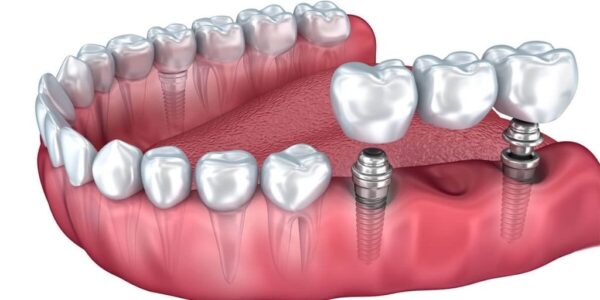Factors to Consider When Choosing Dental Implants
When it comes to replacing missing teeth, dental implants have become a popular and effective solution. However, finding the best dental implants for your specific needs can be a daunting task. With a wide range of options available in the market, it's important to explore your choices thoroughly. In this article, we will discuss the factors you should consider when choosing dental implants, helping you make an informed decision.
>>> best option for dental implants
Types of Dental Implants
Before diving into the decision-making process, it's crucial to understand the different types of dental implants available. The two primary types are endosteal and subperiosteal implants. Endosteal implants are inserted directly into the jawbone, while subperiosteal implants are placed on or above the jawbone, beneath the gum tissue. Each type has its own advantages and considerations, so it's essential to consult with your dentist to determine which type is best suited for your oral health condition.
Key Factors for Choosing Dental Implants
1. Oral Health Assessment:
Before getting dental implants, a thorough oral health assessment is necessary. Your dentist will evaluate the condition of your gums, jawbone, and remaining teeth. This assessment helps determine if you have any underlying oral health issues that need to be addressed before proceeding with implant surgery. Ensuring a healthy foundation is essential for the long-term success of dental implants.
2. Experience and Qualifications of the Dentist:
Choosing an experienced and qualified dentist is crucial when it comes to dental implant procedures. Dentists with specialized training in implantology possess the necessary skills and expertise to plan and execute successful implant placements. Research and seek recommendations to find a dentist who has a proven track record in performing dental implant surgeries.
3. Implant Material:
Dental implants are typically made from titanium or zirconia. Titanium implants have been widely used for decades due to their durability and biocompatibility. Zirconia implants, on the other hand, offer an alternative for individuals with metal allergies or those seeking a more natural-looking option. Discuss with your dentist to determine which material is best suited for your specific needs.
4. Implant Size and Shape:
The size and shape of the dental implant should match your natural teeth for a seamless and aesthetically pleasing result. Your dentist will consider factors such as your jawbone density and available space to determine the appropriate implant size and shape. Customization is key to achieving optimal functionality and appearance.
5. Cost and Insurance Coverage:
Dental implant procedures can be a significant investment. It's important to consider the cost of the implants, the surgical procedure, and any necessary additional treatments. Additionally, check if your dental insurance covers dental implants, as it can help alleviate some of the financial burden. Be sure to discuss all cost-related aspects with your dentist beforehand.
In conclusion, choosing the best dental implants requires careful consideration of various factors. From understanding the types of implants available to assessing your oral health condition, consulting with an experienced dentist, and considering implant materials and customization, each aspect plays a vital role in determining the ideal solution for your needs. By exploring these options thoroughly and making an informed decision, you can regain a confident smile and improve your oral health for years to come.
Bài viết khác cùng Box :
- Cấy mỡ má hóp được bao lâu?
- Cùng tìm hiểu Nám da là gì, tại sao lại xuất hiện nám da
- địa chỉ cấy mỡ mũi ở đâu đẹp
- Cấy mỡ mũi có ưu điểm gì nổi bật?
- Cấy mỡ hốc mắt bao lâu thì đẹp? Cùng thẩm mỹ nakisa tìm hiểu
- Cấy mỡ hốc mắt dưới có an toàn không
- Hút mỡ nọng cằm có nguy hiểm không
- Cấy mỡ tự th n xóa rãnh cười – lấy lại sự tươi trẻ và rạng ngời
- địa chỉ làm đầy rãnh má ở quận 10
- Cách chăm sóc sau khi cấy mỡ hốc mắt
- Top 5 địa chỉ cấy mỡ hốc mắt uy tín tại tphcm
- địa chỉ làm đầy thái dương ở quận 10 chất lượng, uy tín
- Cấy mỡ thái dương bí quyết cho khuôn mặt trẻ đẹp rạng ngời
- Cấy mỡ mặt có tác dụng gì? Có an toàn không?
- Giải pháp cấy mỡ trẻ hóa an toàn – đẹp tự nhiên
- Cấy mỡ toàn gương mặt có đẹp, an toàn không?
- Làm thế nào để giảm mỡ cằm, nọng cằm hiệu quả?
- Sau cấy mỡ kiêng ăn gì và nên ăn gì?
- Sau khi hút mỡ bụng cần làm gì để đẹp, hiệu quả l u dài?
- Những cách chăm sóc sau khi hút mỡ bụng
- Hút mỡ bụng giảm được bao nhiêu kg?
- Hút mỡ bụng mất thời gian bao lâu?
- Hút mỡ bụng nội soi an toàn là gì?
- Quy trình hút mỡ bắp tay không phẫu thuật
- Cao Sâm: Thần Dược Tăng Cường Sức Khỏe và Sự Trẻ Trung
- Lý do đèn chùm châu Âu được người tiêu dùng ưa chuộng
- 9 Lợi Ích Hàng Đầu Của Emothion (S-Acetyl Glutathione)
- Vị trí trong nhà cần dọn dẹp trước ngày Tết
- Rượu Tết đông trùng hạ thảo - Xu hướng rượu Tết Giáp Thìn
- Niềng răng trong suốt và một số thông tin liên quan
Tags:








 Trả lời với trích dẫn
Trả lời với trích dẫn